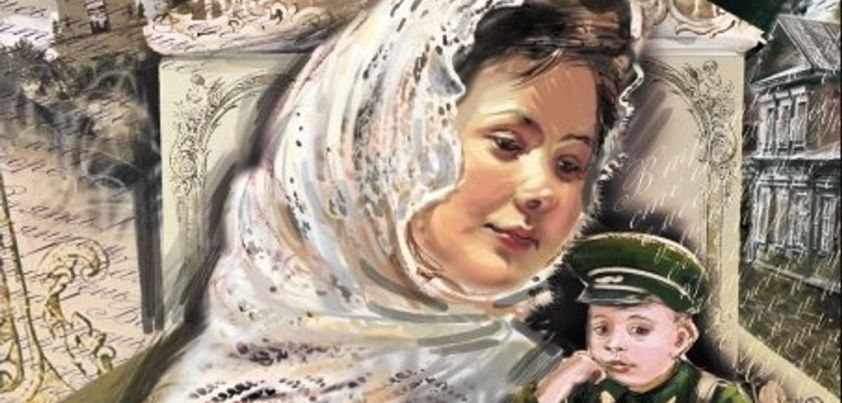 In psychological terms, Anton Chekhov’s ‘darling’ (Olga) suffers from Codependency Personality Disorder. More specifically, she is a vicarious codependent – someone who suspends their identity and gains fulfillment through the accomplishments of another. Olga’s ‘attachments’ in life include her father, a theatre manager, a timber merchant, a veterinary surgeon, and a young boy. Her relationship with the boy differs from the others. Being forced to assume a ‘motherly’ role rekindles Olga’s female identity. Sadly, motherhood and codependency don’t sit well together. In rediscovering her own identity, Olga begins to smother that of the boy. Themes: codependency, subservience, death, abandonment, identity, motherhood. More…
In psychological terms, Anton Chekhov’s ‘darling’ (Olga) suffers from Codependency Personality Disorder. More specifically, she is a vicarious codependent – someone who suspends their identity and gains fulfillment through the accomplishments of another. Olga’s ‘attachments’ in life include her father, a theatre manager, a timber merchant, a veterinary surgeon, and a young boy. Her relationship with the boy differs from the others. Being forced to assume a ‘motherly’ role rekindles Olga’s female identity. Sadly, motherhood and codependency don’t sit well together. In rediscovering her own identity, Olga begins to smother that of the boy. Themes: codependency, subservience, death, abandonment, identity, motherhood. More…
Archives
Rothschild’s Fiddle (Violin)
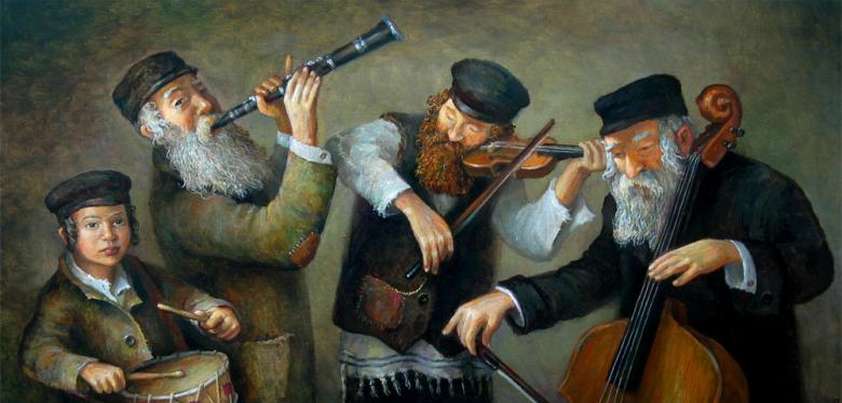 Many of Anton Chekhov’s stories deal with the struggles of the Russian working class. Some, like The Looking Glass and Misery, are quite depressing. This story, which deals with the themes of greed, prejudice and death, includes elements of dark humour and ends on a positive note. Yakov the coffin-builder measures his success by missed moneymaking opportunities. His only happiness is his violin, which he plays in a village band. When his wife dies, he regrets not having done more to enjoy life. He makes some amends on his deathbed by leaving his violin to a most unlikely person. More…
Many of Anton Chekhov’s stories deal with the struggles of the Russian working class. Some, like The Looking Glass and Misery, are quite depressing. This story, which deals with the themes of greed, prejudice and death, includes elements of dark humour and ends on a positive note. Yakov the coffin-builder measures his success by missed moneymaking opportunities. His only happiness is his violin, which he plays in a village band. When his wife dies, he regrets not having done more to enjoy life. He makes some amends on his deathbed by leaving his violin to a most unlikely person. More…
Misery (The Lament)
 Many stories by Anton Chekhov involve grief and suffering. In Misery, sledge driver Iona Potapov is distraught because his son has died and he feels alone in the world. Another translation of the title is “The Lament” (a show or expression of sorrow, etc. for someone who has died or something that is gone). The story addresses the question: What could be worse than the sadness associated with losing a loved one? Chekhov’s answer: To feel so lonely and cut off from the world that you have no one to talk to about it. More…
Many stories by Anton Chekhov involve grief and suffering. In Misery, sledge driver Iona Potapov is distraught because his son has died and he feels alone in the world. Another translation of the title is “The Lament” (a show or expression of sorrow, etc. for someone who has died or something that is gone). The story addresses the question: What could be worse than the sadness associated with losing a loved one? Chekhov’s answer: To feel so lonely and cut off from the world that you have no one to talk to about it. More…
Oysters
 Anton Chekhov wrote hundreds of short, humorous stories like this one to put himself through medical school. A young boy, who is so weak from hunger that he can barely stand, sees a sign in a restaurant advertising oysters. He knows that oysters are some kind of seafood. However, he does not know what they look like. In his hunger-affected state, the boy imagines himself eating creatures half-way between a crab and a frog. He then pictures himself eating up everything around him. He suddenly comes back to earth when two rich “gentlemen” agree to introduce him to real oysters. More…
Anton Chekhov wrote hundreds of short, humorous stories like this one to put himself through medical school. A young boy, who is so weak from hunger that he can barely stand, sees a sign in a restaurant advertising oysters. He knows that oysters are some kind of seafood. However, he does not know what they look like. In his hunger-affected state, the boy imagines himself eating creatures half-way between a crab and a frog. He then pictures himself eating up everything around him. He suddenly comes back to earth when two rich “gentlemen” agree to introduce him to real oysters. More…
A Joke
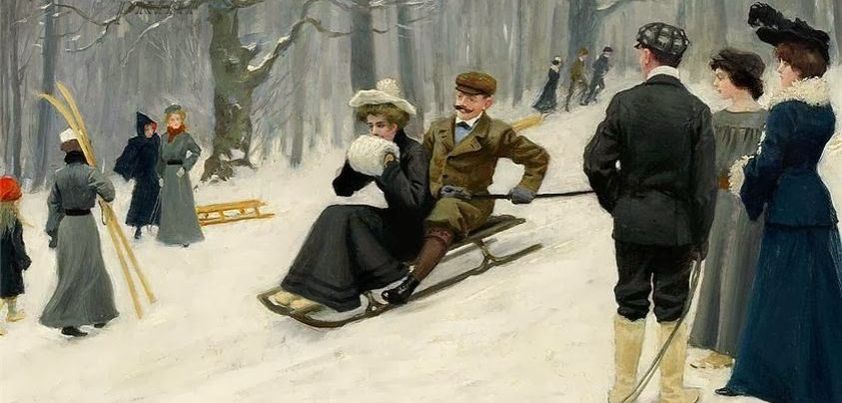 In this short story by Anton Chekhov a young man plays a mean trick on a terrified lady-friend by whispering a ghostly ‘I love you’ as they speed down a mountain on a toboggan. Unsure of what she heard, the woman asks the man to repeat the ride over and over. Each time they do so he whispers the same words, with the same effect. Soon it becomes an obsession and every day she wants to go up the mountain to listen for the words. The woman’s reaction when she thinks she has the answer is a surprise. More…
In this short story by Anton Chekhov a young man plays a mean trick on a terrified lady-friend by whispering a ghostly ‘I love you’ as they speed down a mountain on a toboggan. Unsure of what she heard, the woman asks the man to repeat the ride over and over. Each time they do so he whispers the same words, with the same effect. Soon it becomes an obsession and every day she wants to go up the mountain to listen for the words. The woman’s reaction when she thinks she has the answer is a surprise. More…
The Bet
 This story by Anton Chekhov is about a bet between a wealthy banker and young lawyer. It all started with a discussion about capital punishment (killing people as punishment for serious crimes). The banker claimed that the death penalty was kinder than life in prison; the lawyer disagreed. To prove his point, the banker bet the lawyer a lot of money that he couldn’t survive being locked up for fifteen years with minimal contact with the outside world. At the end of the fifteen years the banker was much wiser but also much poorer… but not from losing the bet. More…
This story by Anton Chekhov is about a bet between a wealthy banker and young lawyer. It all started with a discussion about capital punishment (killing people as punishment for serious crimes). The banker claimed that the death penalty was kinder than life in prison; the lawyer disagreed. To prove his point, the banker bet the lawyer a lot of money that he couldn’t survive being locked up for fifteen years with minimal contact with the outside world. At the end of the fifteen years the banker was much wiser but also much poorer… but not from losing the bet. More…
A Problem
 In this Anton Chekhov story, wealthy family members consider what to do about a nephew who has issued a false promissory note (IOU) in one of their names. Do they repay the debt to preserve family honor and avoid a scandal, or let justice take its course? On learning of the decision, the unscrupulous young man uses it to extort further money from an uncle trying to help him and, in the process, grudgingly admits an unfortunate aspect of his character. Themes: crime and consequences; justice/civic duty vs. family honor; nature vs. nurture, hedonism of the young upper-class, pride, despair. More…
In this Anton Chekhov story, wealthy family members consider what to do about a nephew who has issued a false promissory note (IOU) in one of their names. Do they repay the debt to preserve family honor and avoid a scandal, or let justice take its course? On learning of the decision, the unscrupulous young man uses it to extort further money from an uncle trying to help him and, in the process, grudgingly admits an unfortunate aspect of his character. Themes: crime and consequences; justice/civic duty vs. family honor; nature vs. nurture, hedonism of the young upper-class, pride, despair. More…
The Looking-Glass
 In this story by Anton Chekhov, a young woman dreams 24/7 about getting married and settling down with the perfect man. One night, while sitting in front of her looking-glass, she has a vision of what the future may hold. She sees the reality of living and raising a family in rural Russia in the late 1800s. The vision encompasses many of Chekhov’s common themes: love, hope, disease, fear, financial struggle, the challenges of parenthood, death and despair. The woman’s cry of Why is it, what is it for? introduces a final theme: disillusionment. Her dream has become a nightmare. More…
In this story by Anton Chekhov, a young woman dreams 24/7 about getting married and settling down with the perfect man. One night, while sitting in front of her looking-glass, she has a vision of what the future may hold. She sees the reality of living and raising a family in rural Russia in the late 1800s. The vision encompasses many of Chekhov’s common themes: love, hope, disease, fear, financial struggle, the challenges of parenthood, death and despair. The woman’s cry of Why is it, what is it for? introduces a final theme: disillusionment. Her dream has become a nightmare. More…
A Defenseless Creature
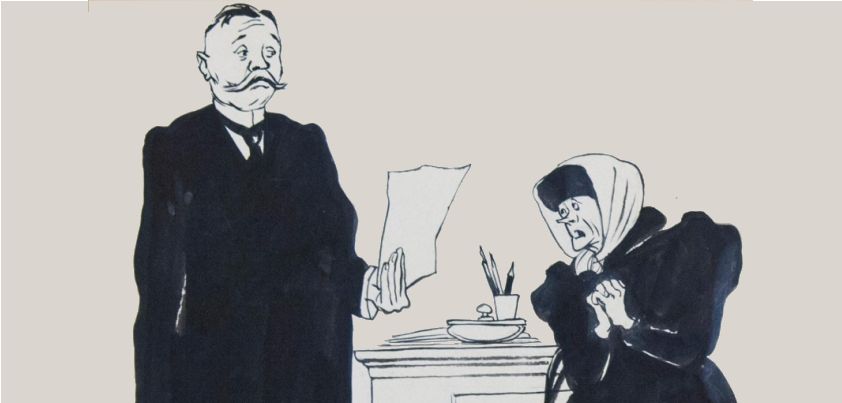 In addition to his tales highlighting serious issues such as poverty, class, death and unfulfilled expectations, Anton Chekhov wrote dozens of comic short stories to support himself through medical school. In this story, a persistent, shrew-like woman wears down a sickly banker. The exasperated man finally pays money the woman claims is owing to her husband out of his own pocket, even though the alleged debt has nothing to do with his bank. Despite the woman repeatedly describing herself as such, readers are left wondering if the harried banker is the titular “defenseless creature”. Themes: bureaucracy, communication, desperation, persistence. More…
In addition to his tales highlighting serious issues such as poverty, class, death and unfulfilled expectations, Anton Chekhov wrote dozens of comic short stories to support himself through medical school. In this story, a persistent, shrew-like woman wears down a sickly banker. The exasperated man finally pays money the woman claims is owing to her husband out of his own pocket, even though the alleged debt has nothing to do with his bank. Despite the woman repeatedly describing herself as such, readers are left wondering if the harried banker is the titular “defenseless creature”. Themes: bureaucracy, communication, desperation, persistence. More…
The Lady With the Dog
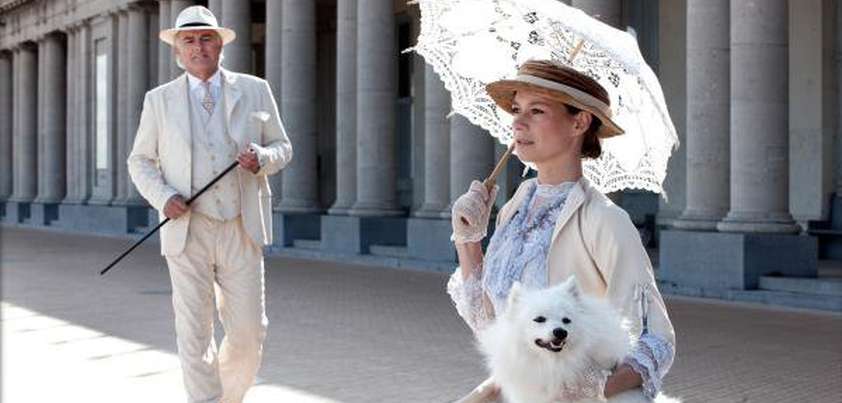 Anton Chekhov’s Lady With the Dog is about a philandering misogynist who meets a much younger woman while on vacation. Both have unhappy marriages; both are open to holiday romance. They enjoy a brief affair, then go their separate ways. After parting, each becomes obsessed with the memory of the other. He tracks her down, and soon they are planning a future together. The story has an open ending, but one suspects that each now looks at relationships and the world in a new way. Themes: love, infidelity, guilt, morality, chauvinism, sexual objectification, commitment. More…
Anton Chekhov’s Lady With the Dog is about a philandering misogynist who meets a much younger woman while on vacation. Both have unhappy marriages; both are open to holiday romance. They enjoy a brief affair, then go their separate ways. After parting, each becomes obsessed with the memory of the other. He tracks her down, and soon they are planning a future together. The story has an open ending, but one suspects that each now looks at relationships and the world in a new way. Themes: love, infidelity, guilt, morality, chauvinism, sexual objectification, commitment. More…
Gooseberries
 For me, the major theme of this philosophical story by Anton Chekhov (the nature of happiness) is conveyed through the symbolization of the plateful of gooseberries. This can be expressed in two seemingly conflicting idioms: one man’s (Ivan’s brother’s) sweet taste of success can leave a sour taste in someone else’s mouth. Put Chekhov’s way, complete happiness shouldn’t exist because it requires contributing to and/or being indifferent to the suffering of others; true fulfillment in life only comes from doing good. Other themes: obsession, greed, ego, class, isolation, mortality, city vs. country life, the beauty of nature. More…
For me, the major theme of this philosophical story by Anton Chekhov (the nature of happiness) is conveyed through the symbolization of the plateful of gooseberries. This can be expressed in two seemingly conflicting idioms: one man’s (Ivan’s brother’s) sweet taste of success can leave a sour taste in someone else’s mouth. Put Chekhov’s way, complete happiness shouldn’t exist because it requires contributing to and/or being indifferent to the suffering of others; true fulfillment in life only comes from doing good. Other themes: obsession, greed, ego, class, isolation, mortality, city vs. country life, the beauty of nature. More…